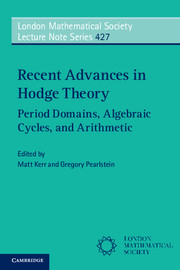Book contents
- Frontmatter
- Contents
- Preface
- Introduction
- List of Conference Participants
- Frontispiece
- PART I HODGE THEORY AT THE BOUNDARY
- PART II ALGEBRAIC CYCLES AND NORMAL FUNCTIONS
- 7 A simple construction of regulator indecomposable higher Chow cycles in elliptic surfaces
- 8 A relative version of the Beilinson-Hodge conjecture
- 9 Normal functions and spread of zero locus
- 10 Fields of definition of Hodge loci
- 11 Tate twists of Hodge structures arising from abelian varieties
- 12 Some surfaces of general type for which Bloch's conjecture holds
- PART III THE ARITHMETIC OF PERIODS
9 - Normal functions and spread of zero locus
from PART II - ALGEBRAIC CYCLES AND NORMAL FUNCTIONS
Published online by Cambridge University Press: 05 February 2016
- Frontmatter
- Contents
- Preface
- Introduction
- List of Conference Participants
- Frontispiece
- PART I HODGE THEORY AT THE BOUNDARY
- PART II ALGEBRAIC CYCLES AND NORMAL FUNCTIONS
- 7 A simple construction of regulator indecomposable higher Chow cycles in elliptic surfaces
- 8 A relative version of the Beilinson-Hodge conjecture
- 9 Normal functions and spread of zero locus
- 10 Fields of definition of Hodge loci
- 11 Tate twists of Hodge structures arising from abelian varieties
- 12 Some surfaces of general type for which Bloch's conjecture holds
- PART III THE ARITHMETIC OF PERIODS
Summary
ABSTRACT. If there is a topologically locally constant family of smooth algebraic varieties together with an admissible normal function on the total space, then the latter is constant on any fiber if this holds on some fiber. Combined with spreading out, it implies for instance that an irreducible component of the zero locus of an admissible normal function is defined over k if it has a k-rational point where k is an algebraically closed subfield of the complex number field with finite transcendence degree. This generalizes a result of F. Charles that was shown in case the normal function is associated with an algebraic cycle defined over k.
Introduction
Let k be an algebraically closed subfield of C with finite transcendence degree. Let X be a smooth complex variety defined over k. Let H be an admissible variation of mixed Hodge structure of strictly negative weights on X (see [Ka], [SZ]). Let ν be an admissible normal function of H, which is a holomorphic section of the family of Jacobians J(H) satisfying some good properties (see [GGK], [Sa3]). Let Z be an irreducible component of the zero locus ν−1(0) of ν. This is algebraic as a corollary of [BP], [KNU], [Sch2] (see [BPS]).
Assume Z is not defined over k. Let K be the (minimal) field of definition of Z. This is the smallest subfield K ⊂C containing k and such that Z is defined over K, see [Gro2, Cor. 4.8.11] (and also [We]). Let R be a finitely generated k-subalgebra of K whose field of fractions is K. Set
S := SpecR⊗kC.
The dimension of S coincides with the relative transcendence degree of K over k, and is called the transcendence degree of Z over k. We may assume that S is sufficiently small by replacing R without changing K. Then S is smooth, and there is a closed subvariety
Y ⊂ X ×S,
defined over k and having the morphisms
f : Y →S, π : Y →X,
induced by the projections and such that π induces an isomorphism
where s0 is the k-generic point of S corresponding to the inclusion R → K → C. (In this paper a point of a complex algebraic variety means always a closed point.)
- Type
- Chapter
- Information
- Recent Advances in Hodge TheoryPeriod Domains, Algebraic Cycles, and Arithmetic, pp. 264 - 274Publisher: Cambridge University PressPrint publication year: 2016
- 1
- Cited by



